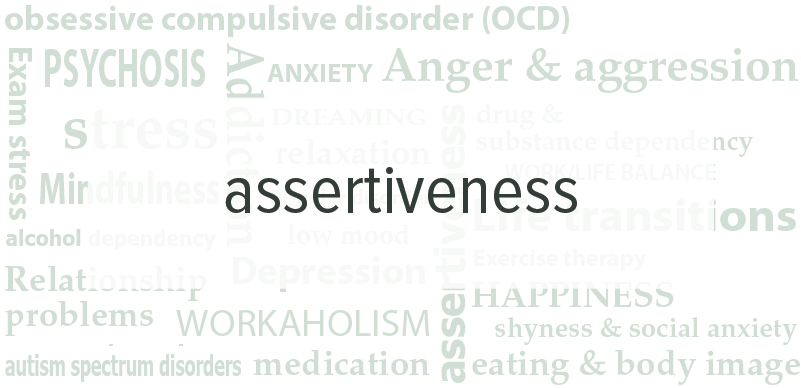Assertiveness
Assertiveness is about communicating with others in an assertive way rather than an aggressive or bullying way. Assertive communicators acknowledge the opinions and feelings of others. They are able to ask for what they want in a non-aggressive way and do not allow themselves to be manipulated or intimidated by others.
Lack of assertiveness can lead to a number of problems. You may take on too much because you said ‘yes’ when you wanted to say ‘no’, then feel resentful and angry; you may worry about your previous actions; or you may experience social isolation because you worry about social interactions or because of your previously hostile behaviour. Low self-esteem and depression are also common. The good news is that you can learn how to be more assertive.
Becoming more assertive
Practise getting your body into an assertive position. Relax your shoulders, stand up straight and maintain eye contact. Keep your posture open, and your voice calm and clear.
Practise difficult situations with friends. For example, if you struggle to make requests at work, you could swap roles to see things from the other perspective.
Practise using ‘I’ phrases. For example, say ‘I think…’, ‘I feel…’ to demonstrate that you own your thoughts and actions.
Give yourself time to regain control in intimidating situations. Reflect on your own opinion rather than going along with a more dominant person’s view.
Use repetition. If you feel nobody is listening to you or you feel someone is avoiding an issue, calmly repeat your request until it is acknowledged and dealt with.
Accept criticism. Acknowledge the criticisms of others. That way the critisms can’t be used against you.
Further information about assertiveness and becoming an assertive communicator
Useful websites:
- www.moodjuice.scot.nhs.uk/assertiveness.asp
- www.teamtechnology.co.uk/assertiveness/how-to-be-more-assertive.html
Feel free to contact us to ask about psychological therapies available at First Psychology Dundee that may help with assertiveness issues.
Thom Irelan, Consultant Counselling Psychologist (Online only)










